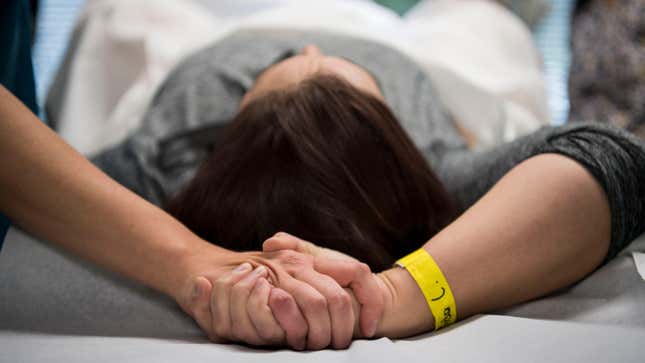At Least 2 More Underage Rape Victims, 2 Pregnant Cancer Patients Denied Abortions in Ohio
Providers say the cancer patients had to pause their chemotherapy after being denied abortions because they were pregnant.
AbortionPolitics

All eyes were on Ohio in July when news broke that a 10-year-old rape victim had been forced to travel to Indiana for an abortion due to Ohio’s six-week abortion ban. Now a new affidavit filed to challenge Ohio’s ban (currently paused until Oct. 12) shows the child wasn’t alone: There are at least two other cases of minors who were impregnated by rape being denied abortion care, according to abortion providers in the state, as well as two documented cases of pregnant cancer patients who couldn’t get abortions and thus couldn’t receive chemotherapy.
According to the affidavit, first reported by the Ohio Capital Journal, three different Ohio women with unwanted pregnancies who were denied abortion care threatened to die by suicide. There were at least three cases of pregnant people with fetal abnormalities, rendering their pregnancies nonviable being forced to remain pregnant, and a case of someone whose pregnancy had made them so sick she couldn’t get off the clinic floor.
Gov. Mike DeWine (R) signed the current abortion ban in 2019, but it only took effect shortly after the Supreme Court overturned Roe v. Wade in June. The law notably doesn’t have exceptions for rape, allowing abortions only when the pregnant person’s life is in imminent danger—which is highly medically risky, dangerously arbitrary, and clearly didn’t help the aforementioned cancer patients.
For months now, we’ve witnessed the horrifying ripple effects inflicted by the fall of Roe on the health system, between a New York woman being denied medication that could cause birth defects for her chronic, debilitating pain because she was of “childbearing age,” and a Louisiana woman forced to carry a skull-less, nonviable fetus. The Kansas City Public Health System at one point stopped giving plan B to rape victims. But for many people, the case of the 10-year-old rape victim from Columbus, Ohio, stood out as particularly jarring—and it turns out this was merely the tip of the iceberg in the state.
-

-

-

-

-

-

-

-

-

-

-

-

-

-

-

-

-

-

-

-

-

-

-

-

-

-

-

-

-

-

-

-

-

-

-

-

-

-

-

-








































